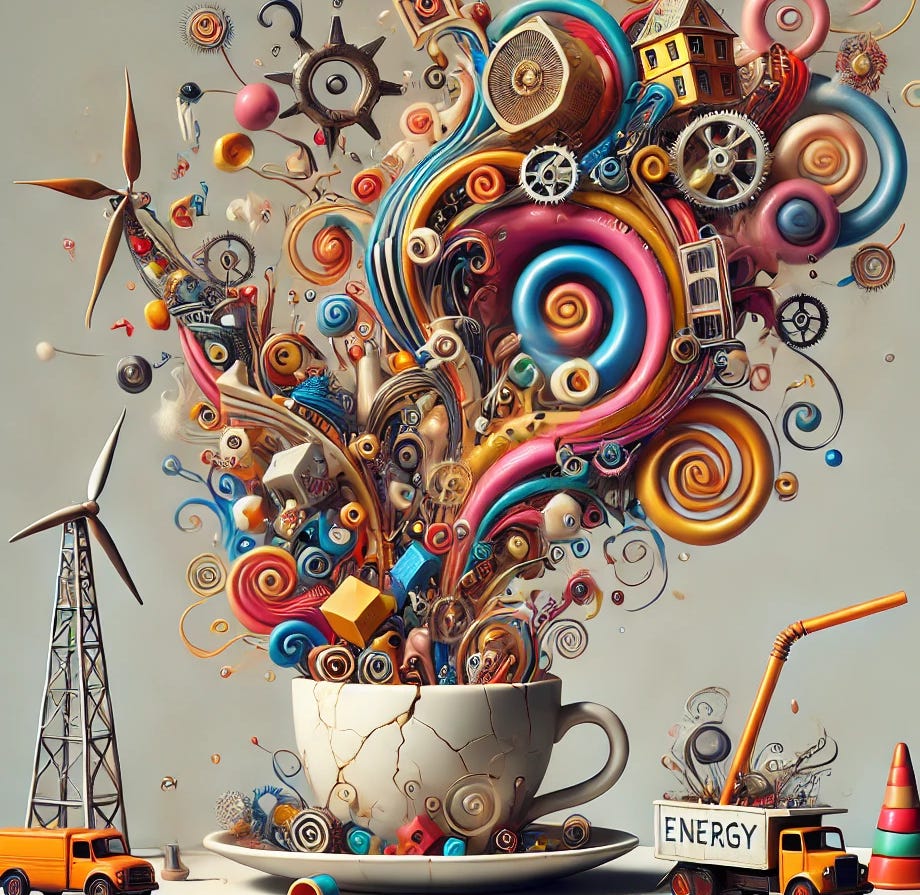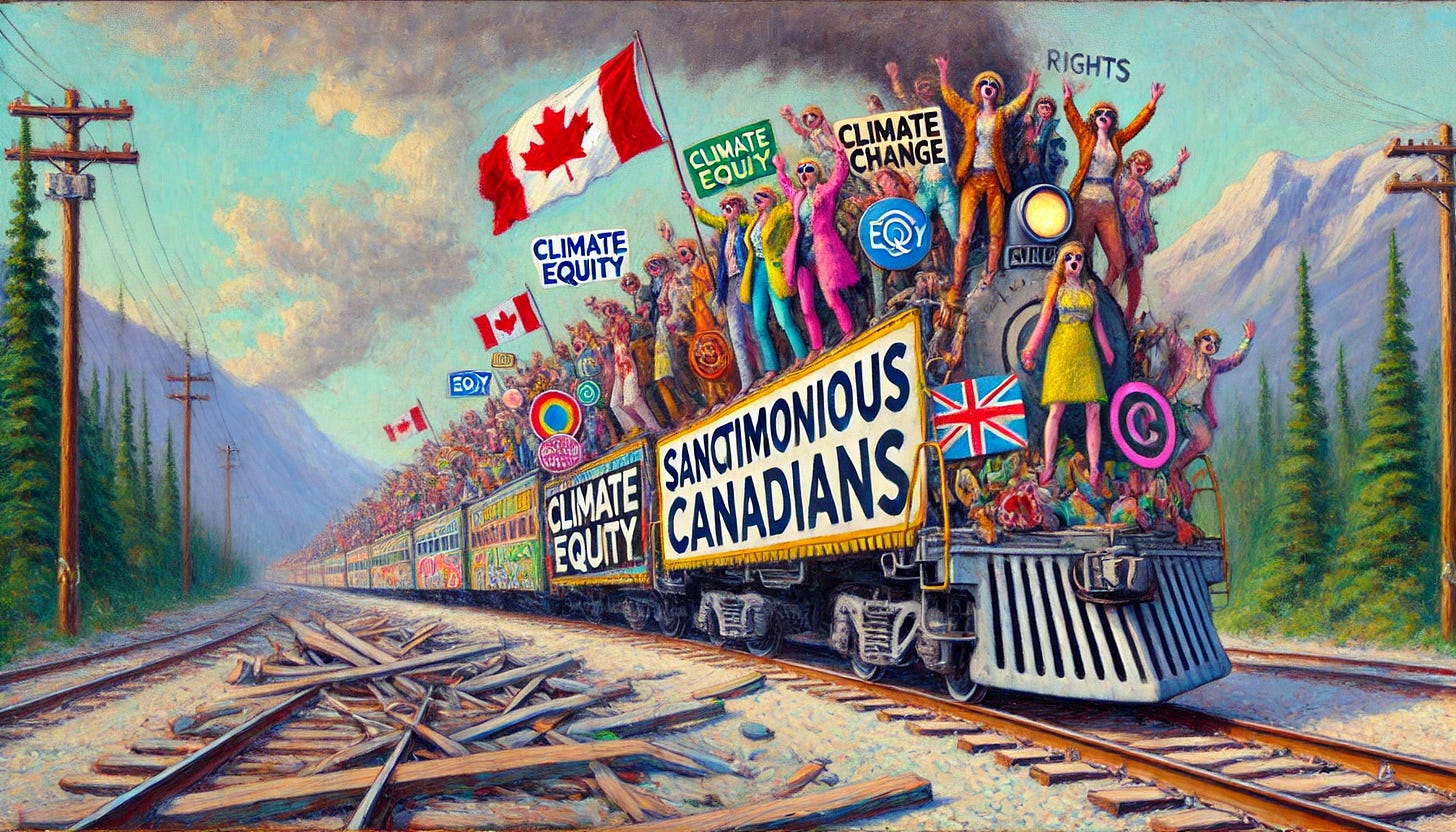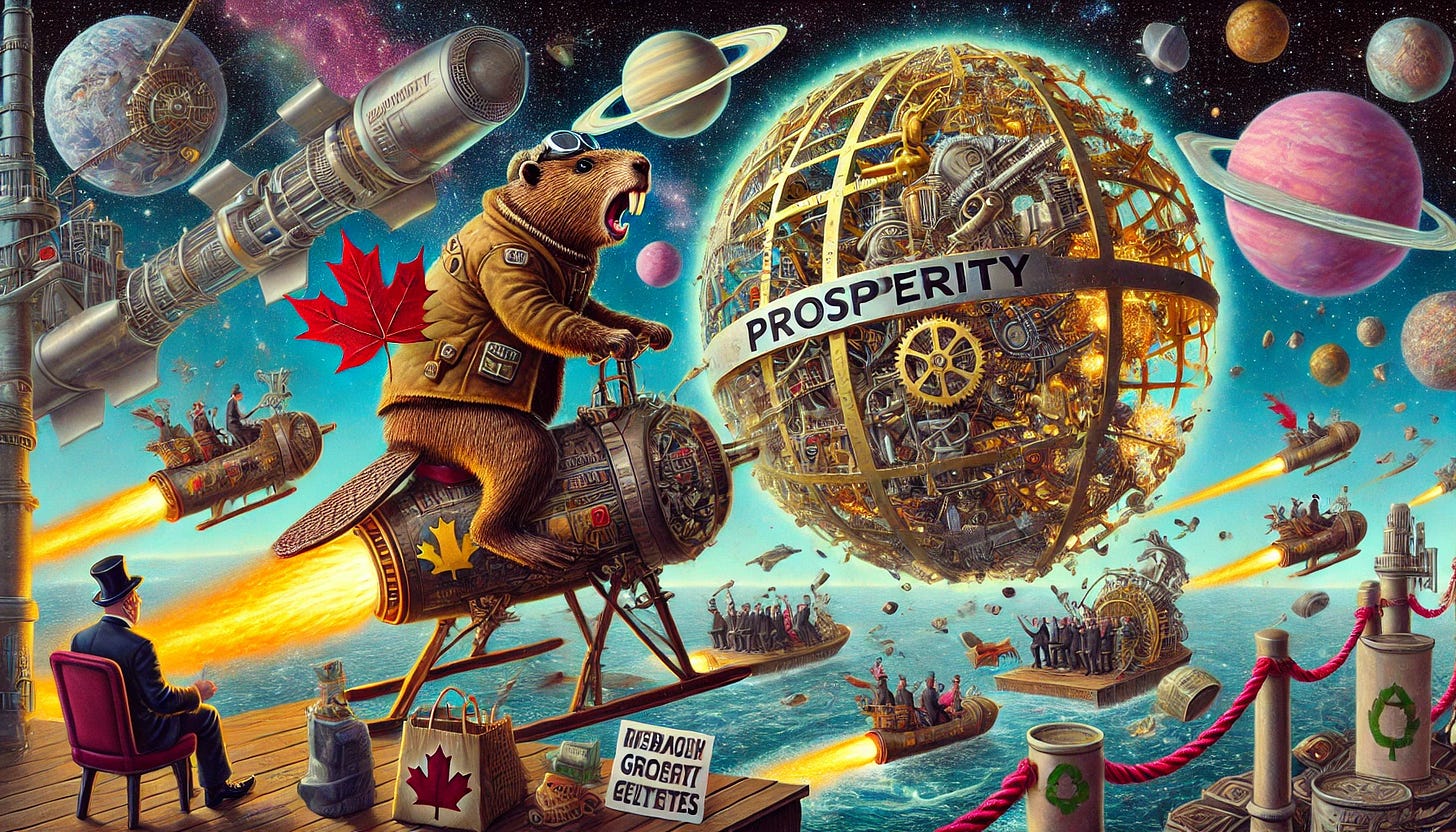Riding the Stupid Train: Canada’s One-Way Ticket to Mediocrity
Where Moral Vanity Replaces Policy, and the Engineers Are Activists with Arts Degrees
If you believe in the importance of free speech, subscribe to support uncensored, fearless writing—the more people who pay, the more time I can devote to this.
Please subscribe to receive at least three pieces /essays per week with open comments. It’s $6 per month, less than USD 4. And now take 50% off.
Everyone says, "Hey, it’s just a cup of coffee," but please choose my coffee when you come to the Substack counter. Cheers.
The squeaky wheel gets the grease. The loudest voice gets the microphone. And that, dear reader, is Canada’s strategic affliction—our defining national tic. We are no longer a serious country, but a nation in a state of hyperventilation. A nation of doormats, flattened by every trendy ideological footfall, from gender dogma to eco-utopian fantasy. Every squeak, no matter how marginal or unhinged, triggers a full-blown institutional convulsion. We mistake noise for substance, hysteria for principle, and compliance for virtue.
Instead of deliberation, we leap—headfirst and hands raised—into whatever is fashionable among the activist class or elite clerisy of the moment. Policy by hashtag. Science by press release. Morality by groupthink. No sooner does a boutique grievance emerge than it is canonised into law, subsidised by taxpayers, and embedded in a bloated bureaucratic shrine.
The result is not progress but paralysis. We don’t just respond to squeaks—we amplify them, reward them, and reshape our society around their demands. And in doing so, we abandon the calm, reasoned centre in favour of a culture where the loudest nonsense commands the most authority.
And we seem to be the slowest to back off; we don’t learn from our mistakes quickly.
We leap aboard each fashionable cause like a nervous seventh-grader desperate to sit at the cool table—off to the doctor, ten-minute chat, and bang—puberty blockers are prescribed like Tic Tacs. Our reflex to surrender is so swift, it reminds me of a tour group I once joined in Beijing: within seconds of meeting a street-corner naturopath, out came the credit cards.
“Your liver needs my pills,” the good doctor declared. Miraculously, everyone had liver trouble.
And no, this wasn’t some dropout-of-AA booze cruise—we were just that credulous.
Diagnose first, bill second. Handholding, then charges. That’s science in Canada.
Examples?
Ah yes, the valiant crusade against plastic straws—a victory so hollow it should be displayed in the Museum of Performative Morality, right next to the Trudeau family’s climate virtue-signaling socks. One poor turtle—yes, one—winds up with a straw in its nose, and suddenly we’re all sipping oat milk through the equivalent of a soggy tampon.
Never mind that paper straws degrade halfway through your drink like a Liberal campaign promise, or that experts (those pesky empiricists) have shown that plastic straws are a negligible fraction of ocean waste. And it all comes from China and India.
But really, who cares? This was never about outcome, only about optics. The ban on plastic grocery bags, for instance, has accomplished precisely nothing measurable for the environment—but has achieved one remarkable feat: furnishing every Canadian kitchen with a grotesque shrine to performative policy, overflowing with so-called “reusable” sacks that will outlast geological epochs. They are the Twinkies of environmental virtue-signalling—indestructible, unloved, and entirely unnecessary.
This is moral masturbation for the environmentally insecure. We’re still riding the stupid train—and it isn’t slowing. On climate, while Norway and the U.S. begin to doubt net-zero fantasies, admitting that fossil fuels are indispensable, Canada barrels ahead. We’re loaded with the fourth-largest oil and gas reserves in the world, yet we blush at the idea of leveraging them.
Another fashionable folly: the nitrogen-fertiliser crusade. Canada adopted EU-style targets—cuts of 30% in agricultural emissions by 2030. Some politicians claim it’s “voluntary,” but the bureaucratic inertia—and activist pressure—tell a different story.
Without nitrogen fertiliser, wheat and barley on the prairies would wither into something that looks like a heat-blasted yellow lawn, doomed by decades of nutrient-depleted topsoil. Yes: plants need nitrogen. Overlook this, and we risk hollowing out Canada’s food security.
Beyond fertiliser, we sprint after any climate fad: divestment, carbon offsets, ESG scores—never once measuring cost versus effect. Like gullible children chanting words they don’t understand, we swallow press releases wholesale—until supermarkets raise prices or industries flee. Meanwhile, other nations wake to pragmatic energy transitions; Canada alone clings tighter to its virtue-signal rope. Trudeau shied away from Germany on LNG exports, preferring to posture rather than lead democracies.
But moral grandstanding is unaffordable for the rest of us.
Meanwhile, we emit 1.4% of the planet’s CO₂, yet insist we’re the carbon 'Death Star,' maintaining EV mandates hastily slapped together without thought.
Politicians even propose criminalising anyone who questions the climate orthodoxy. Mark Carney smiles. Is he waiting to unveil his eco-feudal dream at Davos—post-air-travel, bug-protein dinners, and three wardrobes per year?
Lately, Mark Carney appears to have eased off the throttle of his eco-feudal fantasia, the high-minded fever dream in which the rest of us are expected to freeze in the dark while he and his cohort sip carbon-neutral cocktails at altitude.
One wonders: Did someone ghostwrite his book Values? It reads less like the work of a thinker than the branding memo of a consultancy firm trying to gentrify guilt. Yet there it is—his name on the cover, and so the sermon rolls on.
And what a sermon it is: a polished volume of moral posturing, in which “values” are repackaged as virtue-signalling mandates for those too polite to call them mandates. The message is unmistakable—thou shalt comply.
Carney has now taken off the conductor’s cap on the climate-catastrophe express, thankfully less of the annoyingly younger Davos version of John Kerry—better tailoring, worse prose.
Both men are fluent in the language of global concern, delivered from behind the tinted glass of idling limousines.
These are the kinds of men who wouldn’t know how to pump their gas, yet feel perfectly entitled to lecture the public on how to live, eat, travel, and consume. Their carbon footprints could kick-start an oil sands operation, but they are here to instruct you on restraint.
So, what are we to make of Carney’s apparent moderation? Is this a genuine epiphany—a rare moment of self-awareness—or merely another act in the theatre of elite reinvention?
One can’t help but suspect it’s the latter, like the teenager who abruptly discovers religion, not for any interest in scripture, but because the pastor’s daughter is devastatingly hot. Carney’s conversion feels suspiciously timed and suspiciously convenient. Is his newfound moderation a genuine epiphany or merely a show?
We also swallowed badly debunked “solutions” unquestioningly: microplastics hysteria, the “essential” nature of 100% renewable grids (ignorant of baseload physics), and the “safe” legalisation of hard drugs despite Vancouver’s overdose tsunami.
We hop from one bandwagon to the next, grasping at the loudest parasite on the peripheries—while the centre quietly rots.
Our economy? Canada’s per‑capita GDP has fallen for nearly six straight quarters, including back-to-back years of decline.
Despite population growth, our per-person living standard is sliding—the classic “lost decade.” Sure, total GDP nudges along at roughly 1.5% annually, but when adjusted for our immigration-fuelled population boom and sham housing bubble, it’s clear: we’re building an economy on real estate and international student tuitions—fragile, overpriced, and unsustainable.
Housing now accounts for over 20% of GDP. Mortgages teeter around $2 trillion, and the housing supply crunch cripples young families. And the foreign-student gold rush? It props up university coffers—but leaves us vulnerable to policy swings or border panic. Meanwhile, business investment stagnates, exports sag, and productivity weakens—a growth model built on sand.
Next stop on the Stupid Train: Canadian healthcare, the sacred cow we dare not question lest we be banished as heretics. Mention privatisation and watch your neighbour convulse like you just suggested we outsource C-sections to Lockheed Martin. Canadians, blinkered and brimming with sanctimony, believe there are only two healthcare models: our noble, overburdened queue system or a Mad Max dystopia where poor women are giving birth in an alley behind A&W because their Visa got declined.
Never mind that every civilised country—from France to Sweden to Germany—has some mix of public-private provision. But in Canada, nuance is treason, reform is heresy, and questioning the holy Medicare relic is tantamount to wanting pensioners to perish in hospital parking lots. Here, moral superiority substitutes for effective policy.
The electric vehicle mandate is not policy—it is cargo cult economics at Tesla charging speed. It presumes, like a child in a cape flinging himself from the roof, that wanting to fly is the same as flight. Our governments, drunk on their press releases, have decided that infrastructure, demand, and physics will obediently follow the political will like sycophants on a subsidy leash.
Billions have been torched—yes, torched—not invested in battery plants that already look like rusting monuments to ministerial fantasy. But pork, when wrapped in green rhetoric, is still pork.
It stinks, it fattens friends, and it accomplishes nothing but political theatre. Only in Canada could a government declare war on internal combustion without ensuring there’s a charging station between Sudbury and civilisation. Market signals? Consumer choice? Efficiency? No, dear citizen—this is Ottawa’s electric commandment: Let there be batteries, and lo, the factories rose… and promptly collapsed under their unsustainable weight.
All the while, basic economics unravel: per-capita GDP is declining, debt is skyrocketing, productivity is sagging, house prices are inflated by speculation and migration, student tuition dependency is growing, and real estate mania is built on borrowed time. The federal government now proposes grand acts of economic integration and critical minerals development—but they arrive late, after years of chasing fads and putting our future on hold due to moral vanity.
So we must ask: Is niceness worth national decay? Is avoidance of conflict worth declining prosperity? Is peacocking on virtue worth erasing our economic foundations? The squeaky wheels—the activists, the bureaucrats, the tenured virtue-signalers—have hijacked our narrative. They don’t see price tags; they see hashtags. They don’t think about tomorrow; they think about the trending topic.
It’s high time Canada learned that being polite doesn’t mean being right. That standing up isn’t rude — it’s necessary. And that true national leadership requires courage, not karaoke virtue. Either we derail the stupid train, or we’ll be left apologising at the tracks for a country that lost its way.
If you found value in this article and wish to support my ongoing work, please consider leaving a tip. Your support helps me continue producing uncensored content on critical issues.











“‘Feminised culture’ is often used in a critical context to describe a society that places a higher value on traits typically associated with femininity, such as cooperation, empathy, compromise, and emotional expression, over traditionally masculine traits like competition, assertiveness, and individualism. While these traits should ideally be balanced in a healthy society, an overemphasis on feminised values can lead to a weakening of culture, especially in areas like leadership, national identity, and public discourse.”
Women are the civilizing force of the world. When the power to shame runs amok, this is what you get. Cancel culture.
Anything traditionally feminine is considered harmless and ineffectual in today’s parlance but, as we can see, that is not true.